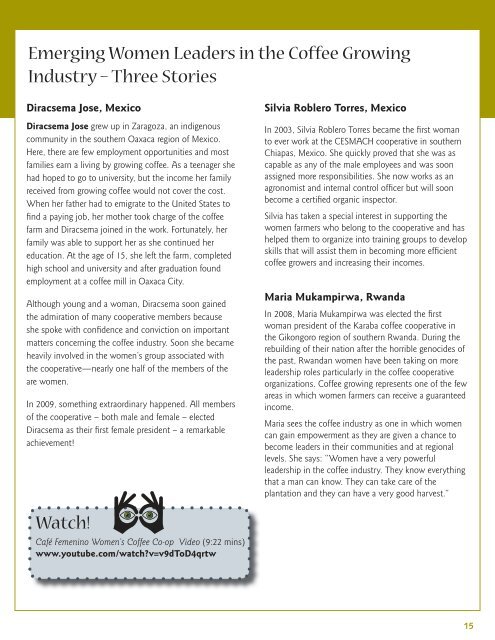Coffee Case Study - judes
Coffee Case Study - judes
Coffee Case Study - judes
Create successful ePaper yourself
Turn your PDF publications into a flip-book with our unique Google optimized e-Paper software.
Emerging Women Leaders in the <strong>Coffee</strong> Growing<br />
Industry – Three Stories<br />
Diracsema Jose, Mexico<br />
Diracsema Jose grew up in Zaragoza, an indigenous<br />
community in the southern Oaxaca region of Mexico.<br />
Here, there are few employment opportunities and most<br />
families earn a living by growing coffee. As a teenager she<br />
had hoped to go to university, but the income her family<br />
received from growing coffee would not cover the cost.<br />
When her father had to emigrate to the United States to<br />
find a paying job, her mother took charge of the coffee<br />
farm and Diracsema joined in the work. Fortunately, her<br />
family was able to support her as she continued her<br />
education. At the age of 15, she left the farm, completed<br />
high school and university and after graduation found<br />
employment at a coffee mill in Oaxaca City.<br />
Although young and a woman, Diracsema soon gained<br />
the admiration of many cooperative members because<br />
she spoke with confidence and conviction on important<br />
matters concerning the coffee industry. Soon she became<br />
heavily involved in the women’s group associated with<br />
the cooperative—nearly one half of the members of the<br />
are women.<br />
In 2009, something extraordinary happened. All members<br />
of the cooperative – both male and female – elected<br />
Diracsema as their first female president – a remarkable<br />
achievement!<br />
Watch!<br />
Café Femenino Women’s <strong>Coffee</strong> Co-op Video (9:22 mins)<br />
www.youtube.com/watch?v=v9dToD4qrtw<br />
Silvia Roblero Torres, Mexico<br />
In 2003, Silvia Roblero Torres became the first woman<br />
to ever work at the CESMACH cooperative in southern<br />
Chiapas, Mexico. She quickly proved that she was as<br />
capable as any of the male employees and was soon<br />
assigned more responsibilities. She now works as an<br />
agronomist and internal control officer but will soon<br />
become a certified organic inspector.<br />
Silvia has taken a special interest in supporting the<br />
women farmers who belong to the cooperative and has<br />
helped them to organize into training groups to develop<br />
skills that will assist them in becoming more efficient<br />
coffee growers and increasing their incomes.<br />
Maria Mukampirwa, Rwanda<br />
In 2008, Maria Mukampirwa was elected the first<br />
woman president of the Karaba coffee cooperative in<br />
the Gikongoro region of southern Rwanda. During the<br />
rebuilding of their nation after the horrible genocides of<br />
the past, Rwandan women have been taking on more<br />
leadership roles particularly in the coffee cooperative<br />
organizations. <strong>Coffee</strong> growing represents one of the few<br />
areas in which women farmers can receive a guaranteed<br />
income.<br />
Maria sees the coffee industry as one in which women<br />
can gain empowerment as they are given a chance to<br />
become leaders in their communities and at regional<br />
levels. She says: “Women have a very powerful<br />
leadership in the coffee industry. They know everything<br />
that a man can know. They can take care of the<br />
plantation and they can have a very good harvest.”<br />
15


